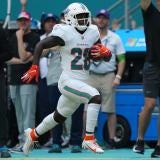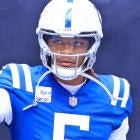We can learn a lot from what happened in 2018 as long as we're careful not to learn too much. Makes perfect sense, right?
There's a danger in expecting the best (or worst) Fantasy performances of 2018 to repeat themselves. That's especially true if those performances were based on touchdown or efficiency spikes as opposed to volume-based performance. These are the running backs you may wan to look a little bit closer at heading into 2019 with an eye towards their coming regression.
| ||||||||||
One of the ways we've evolved as an industry is that we no longer use yards per carry as the sole standard of whether a running back is good. There are plenty of things that go into a running back's YPC, including several that have little to do with the running back's talent. But that doesn't mean it's irrelevant.
At the very least, it can make spotting regression just a little bit easier.
Including Phillip Lindsay, 27 running backs have averaged better than 5 yards per carry in the past 10 years (minimum 150 carries). Jamaal Charles is the only back to do it in back-to-back years. Only a handful of backs did it more than once since 2009. Just about any back you see above this mark is an automatic regression candidate.
What makes Lindsay an even better candidate was his production in the red zone. He scored five times inside the 5 on just six opportunities. All but three of the backs with that many scores inside the five had double-digit attempts. Lindsay had six scores from inside the 10, and his 13 attempts were the lowest of any back who scored that often.
With all signs pointing towards another timeshare in Denver, you should expect Lindsay to take a big step back in Fantasy production.
Also Consider: Kerryon Johnson, Nick Chubb, and Aaron Jones all stand out as likely regressors in terms of yards per carry, even though Jones has technically done it twice in a row. But I'm not quite as worried about this group because we have been given an indication that each of their carries go up. I still wouldn't expect them to be as efficient, but an increase in volume could make up for it.
I'm the least worried about Johnson in this group because unlike the rest of these backs he appears to have had bad touchdown luck.
| ||||||||||
James White scored once every 12.4 receptions and once every 18.8 rush attempts last season. Entering 2018, he'd scored once every 13.4 receptions and once every 56.5 rush attempts. In other words, he isn't likely to match his career-high 12 touchdowns without a serious increase in volume. Considering the addition of Damien Harris that seems unlikely. Especially since White saw 51 more targets and 51 more carries than he ever had in a season.
White could still be a valuable low-end No. 2 running back in PPR, but you shouldn't expect anything close to his 2018 numbers.
Also Consider: Kenyan Drake, Alvin Kamara and James Conner all scored at a much higher rate than you would reasonably expect them to replicate. Kamara was in this column last year because of his averages, and those both came back to reality in 2018. The nice thing with him is that it would be really hard for him to regress enough to fall out of the top four. Conner also has a nice floor because of his volume. So the obvious concern in this group is Drake. If he doesn't see an increase in touches, it wouldn't be surprising to see his touchdowns cut in third.
| ||||||||||
Tarik Cohen has a similar problem as Phillip Lindsay. He's probably not going to match his 2018 efficiency and he doesn't likely have a path to a significant increase in workload. Cohen averaged 10.2 yards per reception in 2018 a year after averaging 6.7. Sure, a new coaching staff deserves credit for some of that, but I really don't want to count on a running back averaging 10 yards per reception. I also don't want to count on Cohen scoring eight times on 170 touches again. In his rookie year, Cohen scored three times on 140 touches. Somewhere in the middle would make more sense.
Like White, Cohen could still be a low-end No. 2 running back in PPR, even with regression.
| ||||||||||
I'm sure you're aware about 60% of Derrick Henry's Fantasy production came of the last four weeks of the season. But did you know 15% of his rushing yards came on two plays. Without those two carries his rushing average drops to 4.2 YPC, or the same number he posted in 2017. Of course it's not fair to take the carries away from Henry, but it's not really fair to expect another 99-yard touchdown either. Also, Henry scored 10 touchdowns on his first 286 carries, so you probably shouldn't expect 12 touchdowns again in 2019.
| ||||||||||
I don't want you to think all regression is negative. Some times players get a little unlucky and the following year they regress back to more normal numbers. That's exactly what I would expect from Ezekiel Elliott's touchdowns. No one had more red-zone carries (39) than Elliott and scored fewer touchdowns from the red zone. He only scored twice from inside the 5 despite 10 attempts. In 2017, Elliott had eight attempts in 12 games and scored on half of them. In 2016 he scored seven times on 11 attempts inside the 5. The expectation should be double-digit rushing touchdowns.
Also Consider: Dion Lewis, Kerryon Johnson and Dalvin Cook all had pretty rotten touchdown luck in 2018. Lewis specifically is almost free in drafts despite the fact that he's established as the third-down back in Tennessee and is just a Derrick Henry injury away from a feature role. The Titans schedule features 10 high-profile offenses, so it wouldn't be surprising at all if they end up throwing more than they'd like to.







































